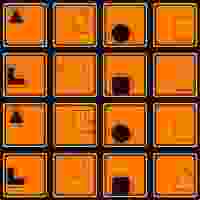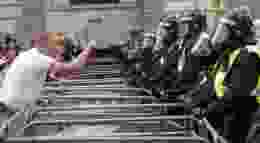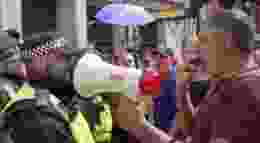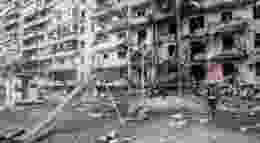
Jordan Peterson, Carl Jung and the Rise of the Individual
Ken Crawford believes that of all the prominent figures in Western society today, Jordan Peterson is the closest we have to an heir to Carl Jung and his approach to analytical psychology.
Jordan Peterson burst onto the scene in Britain with the Cathy Newman interview which can be viewed and now has over 10 million views on YouTube. Publication of his book, 12 Rules for Life, followed shortly after, becoming a best seller around the western world. A lecture tour is now in progress and plays to sellout crowds. Peterson's core message is one of character development and individual responsibility as drivers of how our society should function and evolve.
A fuller understanding of Peterson's work requires an understanding in turn of Carl Jung, a contender for the most remarkable thinker Western civilization ever produced. Peterson draws on Jung extensively in his University teaching material and references him frequently in his public talks. This short clip gives a sense of the value Peterson places on Jung's work.
The BBC interviewed Jung in 1959, shortly before his death, giving a valuable insight into this remarkable man, including his relationship with Sigmund Freud and a response to some profound questions towards the end of the interview, especially on the events after death. Here Jung is aged 84 but his core work, the Red Book, was written decades earlier. For reasons that will become clear later, the Red Book was not published until 2008, long after Jung's death as his heirs also delayed publication until, presumably, a time they thought society was ready. It is perhaps more helpful to regard Jung as a western shaman, a visionary pushing the boundaries of thought and experience far beyond what most people are capable of.
Jung's self-experiment was to switch off consciousness and dream in a waking state. In so doing he directly experienced the 'collective unconscious' in a high powered state rather than the lower power state of the sleep dream. The collective unconscious, in Jung's view, contains the experience of everyone who ever lived or will ever live. Since the normal rules of time and space do not apply there, Jung found it possible to interact with the most diverse and extraordinary range of personalities. The Red Book details some of these experiences, his debates with the Devil, his meditation with the spirit of Christ and his thoughts on the challenges of the future. Chillingly this includes a visioning that evil will crystalize and emerge with an intensity we have not experienced before. It is a book that must be read fully to be experienced and I will not do it the injustice of attempting to summarize Jung's own conclusions. It will likely be a tough read for anyone aged under 40 and perhaps bamboozling, dangerous even, to anyone under 30 unless they have had an unusual amount of life experience. I would caution any reader of the Red Book to beware of unearned wisdom. It is a book that needs a great deal of reflection over time, a lifetime even, not something that should be quickly snatched at and acted upon. I have not fully processed the Red Book myself, though I believe it is correct to state that development of the individual is a core theme.
Jung believed that humanity experiences periods of great upheaval that could be predicted, for reasons of synchronicity, on an astrological basis using aeons of around 2100 years. He gives practical details in Aion (published 1951 and described by Peterson as a 'terrifying' book). The aeon of Pisces (the fish) began around the time of Christ and humans swam as fish in the sea of Christianity. The next aeon is that of Aquarius, the water carrier, where perhaps the individual must carry a burden themselves in some fashion in a way we have not done before. The First World War made a great impression on Jung and there is a suggestion in the Red Book he believed the madness of the war brought the aeon of Pisces to a close, given the huge dislocation in Christian values. The Red Book articulates what this means for humanity's relationship with God and it chimes with a new aeon where the individual becomes more significant. Recall Jung's vision that humanity faces perhaps the most palpable force of evil ever witnessed in the coming generations. There is a need for society to develop individuals of great strength of character for the unique challenges ahead.
Jordan Peterson is familiar with all this material, having read the complete works of Jung. His one criticism of Jung has been that he kept too much to himself and did not engage with a wide audience but then Peterson is an extravert, Jung an introvert. The full message of Jung presented in the Red Book seems too big for a mass audience to take in one shot, too big a hit to the western psyche and likely to be quickly rejected. Peterson is instead starting with a simple message – 'tidy your room', 'get your own house in order', a call to individual responsibility that is digestible by the masses, especially the younger generation. Of all the prominent figures in Western society today, Jordan Peterson is the closest thing to an heir to Jung. I cannot say how far Peterson will push events in his own lifetime, but I have some sense of how far he could push given the credibility and size of following he is generating – a seismic shift in society in terms of the value we see in ourselves as individuals. In full effect, it could be the same upheaval society experienced when Christianity spread through the Roman Empire 2000 years ago, fundamentally reworking Western values and how we saw the world. Rather than a complete reworking, perhaps we will experience a reinvigoration of those values but with a change of emphasis. Jung believed that Christ showed the way but in doing so he followed no model and did not emulate anyone. Your own cross to bear, your own sacrifice, your own life redeemed in your own way under the law of love, under which even the lowest in you must be accepted. Such is the way of the individual as Jung expressed it. That is why I watch the work and progress of Jordan Peterson with such interest. How does an individual guide a society, a mass of people, to the way of individuality?













